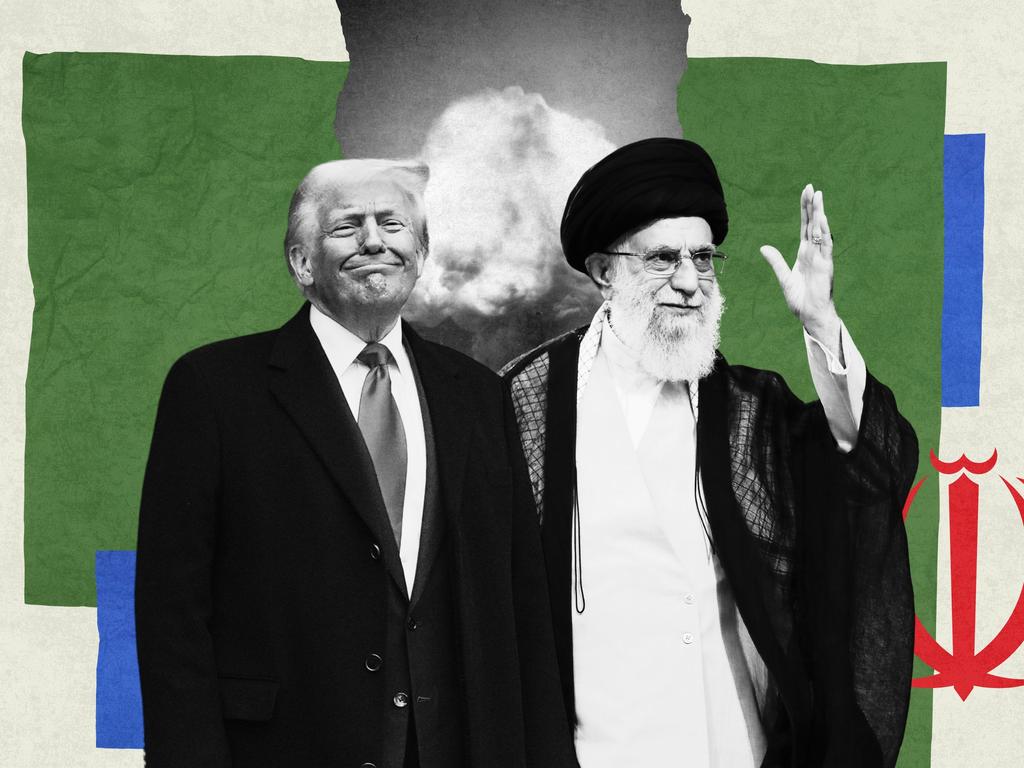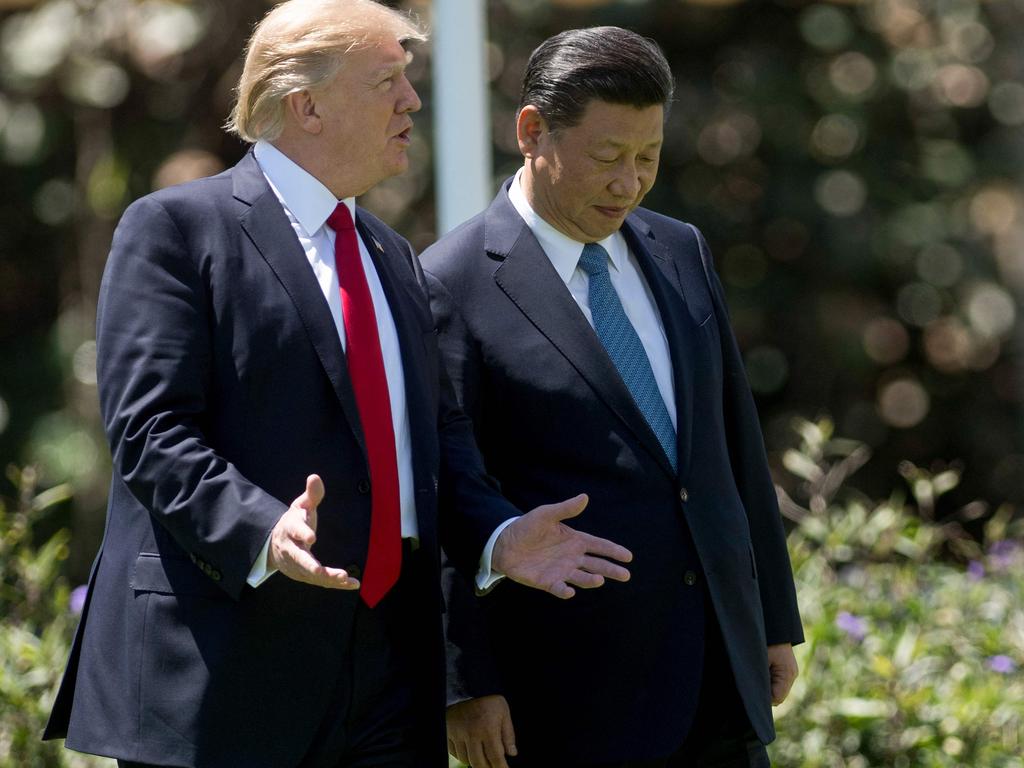Albanese, Dutton: Time to tell the truth about Trump
Australia is now caught in a retail politics contest while the world is being transformed.
Donald Trump blinked, big time. The economic crisis has changed – but it’s still here. The tariffs on Australia remain and the US-China economic confrontation has deepened. The reality is that Australia is still trapped, locked in an election that belongs to a world that is now passing.
Anthony Albanese and Peter Dutton have got three weeks to respond to a crisis that mocks the largely irrelevant Australian election campaign – the message is that future success is owned by nations that are fast, flexible and bold. Australia rates badly on each count.
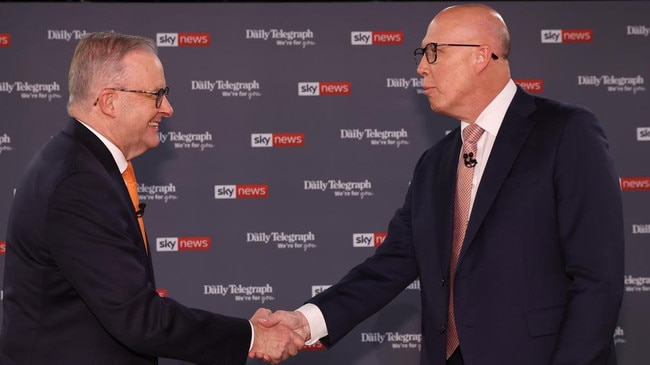
Australia is now caught in a retail politics election while the world is being transformed. The Sky News leaders’ debate this week revealed the problem – a debate focused on the public’s justified alarm about cost-of-living pressures – with an almost total absence of the real issues responsible for our underperformance.
This debate was about spend, spend, spend – on health, schools, housing, transport and more fuel excise relief. The fiscal folly of the Albanese government has been its excessive spending, yet this is still the public’s demand. The Opposition Leader and his Treasury spokesman, Angus Taylor, promise less spending and a more responsible budget, but they are deliberately vague on how to get there – for good reason.
In the treasurers’ debate, Jim Chalmers called on Taylor to “come clean” on his cuts. Exploiting the Trump factor, Chalmers cast the Coalition as Trump-lite, a party of “DOGE-y sycophants who have hitched their wagon to American style slogans and policies”. He pressed Taylor about repeating the Tony Abbott 2013 campaign spending pledge of “no cuts” and Taylor’s answer was no cuts to “essential services” – leaving the Coalition room to revise fiscal policy.

It illuminates our plight. Australia today suffers from projected budget deficits for 10 years, record spending, unsustainable levels of personal income tax, poor productivity feeding into weak living standards, an unfolding demographic time bomb and a grossly inadequate defence budget.
Yet none of these issues is discussed. They are strictly off the agenda – too hard, too dangerous. In this campaign we witness the collapse of the election process as a method to address the national interest challenges facing Australia.
In March, economist Chris Richardson told Inquirer: “We, as an electorate, have asked our politicians to avoid challenging us. In this election the two sides seem to be agreeing on mediocrity. We have stopped fighting harder for our future.” The campaign, to this stage, confirms that judgment.
Labor has outsmarted the Coalition in responding to our changed culture. Voters are disenchanted, distrusting of the major parties, angry about their situation yet suspicious of change, focused on their personal plight, unwilling to make sacrifices for the common good, aware that things have gone wrong but uncertain about the way forward.
Invoking the 2014 budget highlights a turning point for the nation. At that time Abbott and his treasurer, Joe Hockey, seeking to address deficits and debt, unveiled tough measures in the national interest – only to be repudiated by the public. It was a threshold event; its shadow is still with us. Ever since, there has been no constituency in this country for deficit and spending reduction.
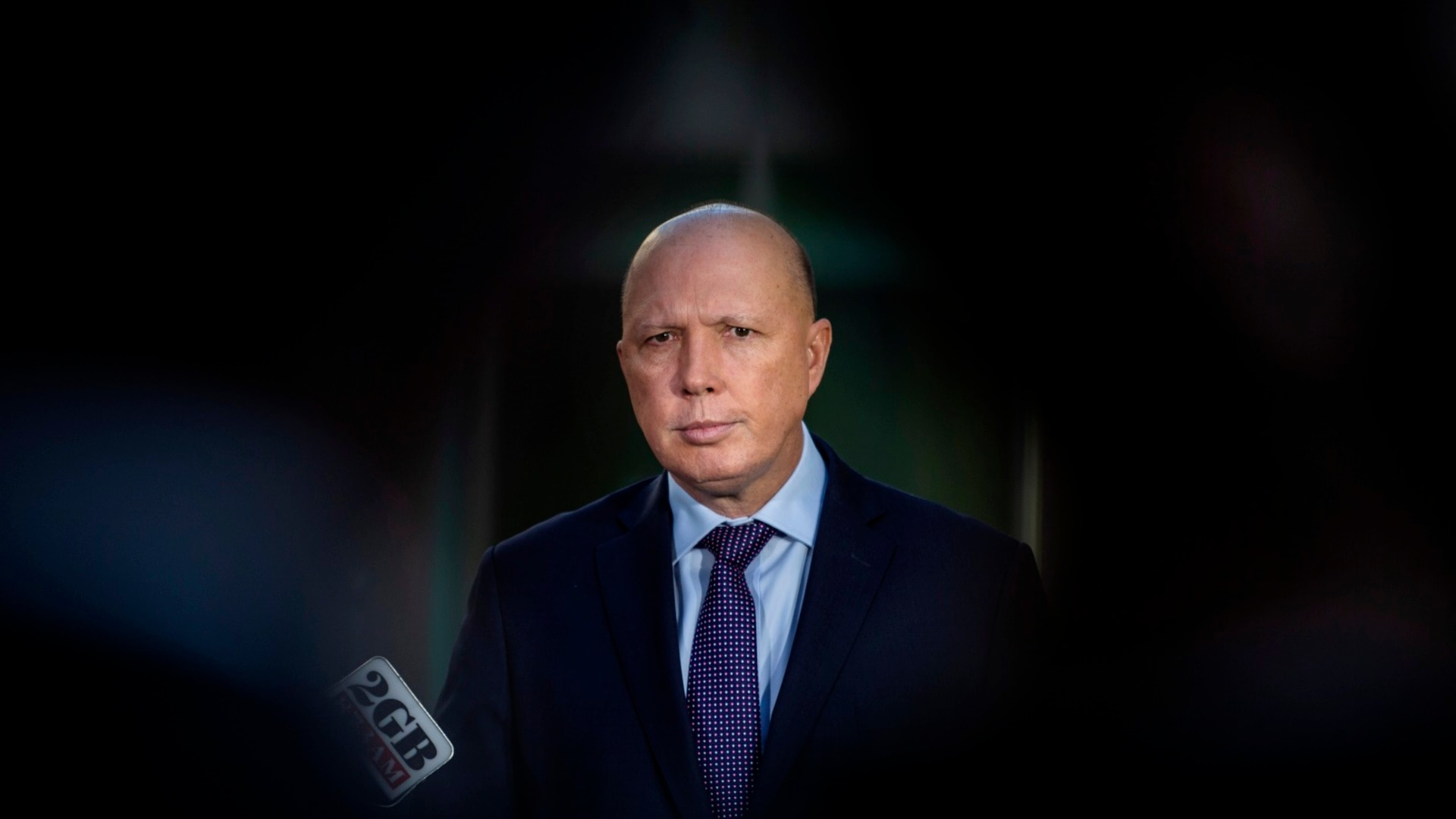
The election reveals the Coalition’s unresolved dilemma – its traditional policy tools are in retreat, it’s hard to sell fiscal accountability, industrial relations reform, tax reform, greater public sector efficiency, cuts to red and green tape, more restraint in the phase-out of fossil fuels and more defence spending if that eclipses social outlays.
The campaign, to this stage, reveals a Coalition unready, short of the hard policy work, with confusion about the policies it has released – it lost a worthwhile position on working from home; its energy and gas policies are brave but riddled with problems; its proposal for two new future funds seems bizarre and works contrary to its professed aim of cutting debt.
The Sky debate narrative is under pressure from another narrative: which side can best handle another global crisis? In this sense expectations about election 2025 have properly risen. Albanese and Dutton, backed by Chalmers and Taylor, must manage two stories: the cost-of-living test and the global economic test imposed by Trump. This constitutes a complex blend of retail politics and trust at crisis management.

In a previous world every prime minister from Malcolm Fraser to Kevin Rudd would have released in a stage-managed campaign event a statement of the principles that would guide Australia’s response to the Trump crisis. This is not to deny that both sides are right, so far, in rejecting tariff retaliation against the US and talking up trade diversification. That’s just policy 101. But a measure of higher leadership is required.
Trump has left Australia worse off in comparative terms. His 90-day pause applies to higher alleged reciprocal tariffs but the 10 per cent baseline tariff remains in place – the rate applying to Australia with Trump threatening further action on pharmaceuticals.
Treasury Secretary Scott Bessent said: “We can probably reach a deal with our allies.” Sounds good. Maybe. But what sort of deal?
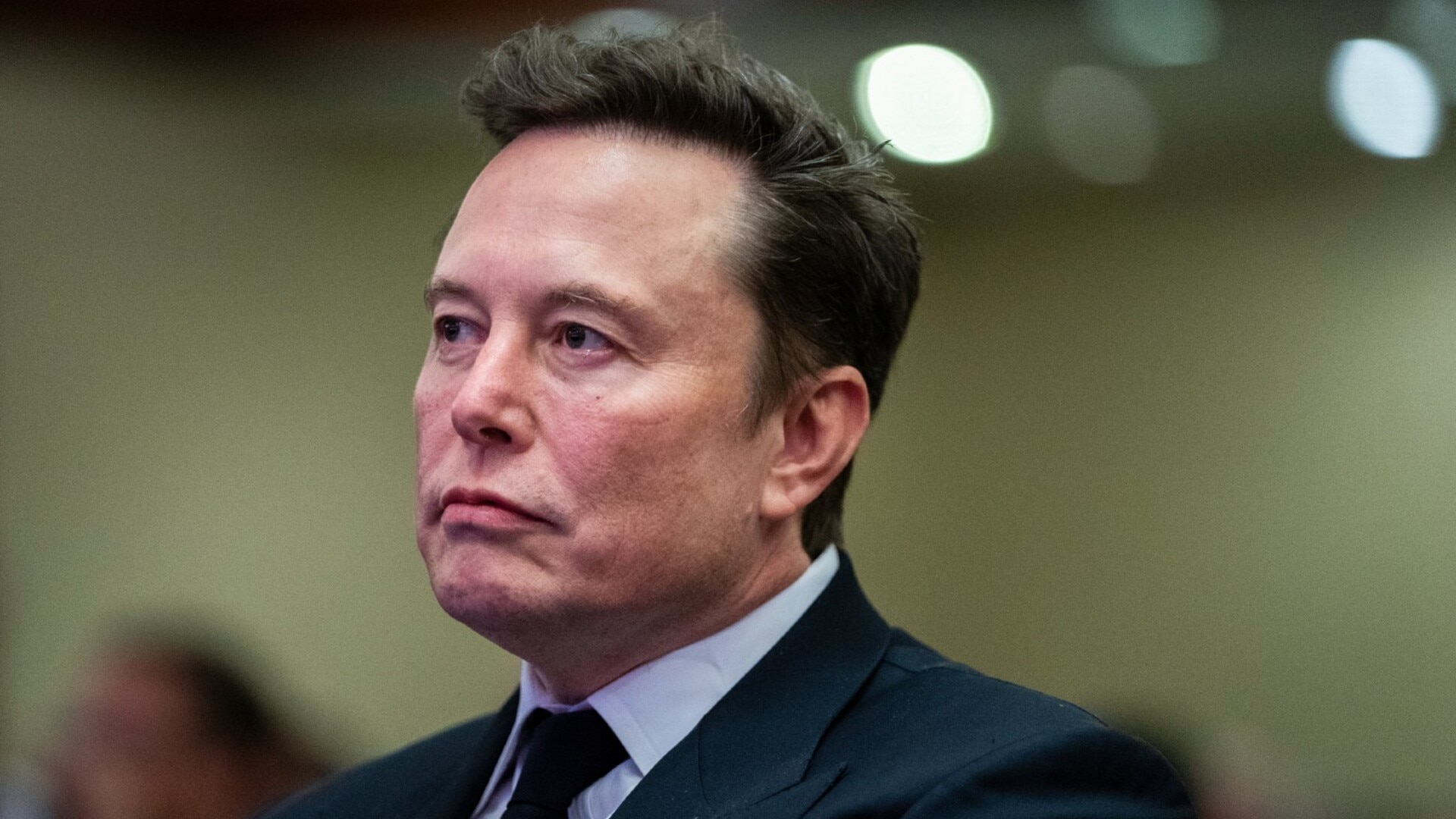
Here’s the rub – that Trump may want his allies (think Australia) to align with his coercive trade campaign against China. Albanese won’t do that. Nor will Australia’s business and trade community. Presumably neither would the Coalition. That would be a stake in the heart of Australia’s national economic interest with any rejection creating potential huge tensions with Trump.
Might that affect AUKUS or is that too fanciful?
China’s insufferable hypocrisy was on display this week with its ambassador to Australia, Xiao Qian, saying the two nations should “join hands” to defend global trade. That’s just a few years after China tried to break Australia’s will in a campaign of trade coercion and intimidation against us.
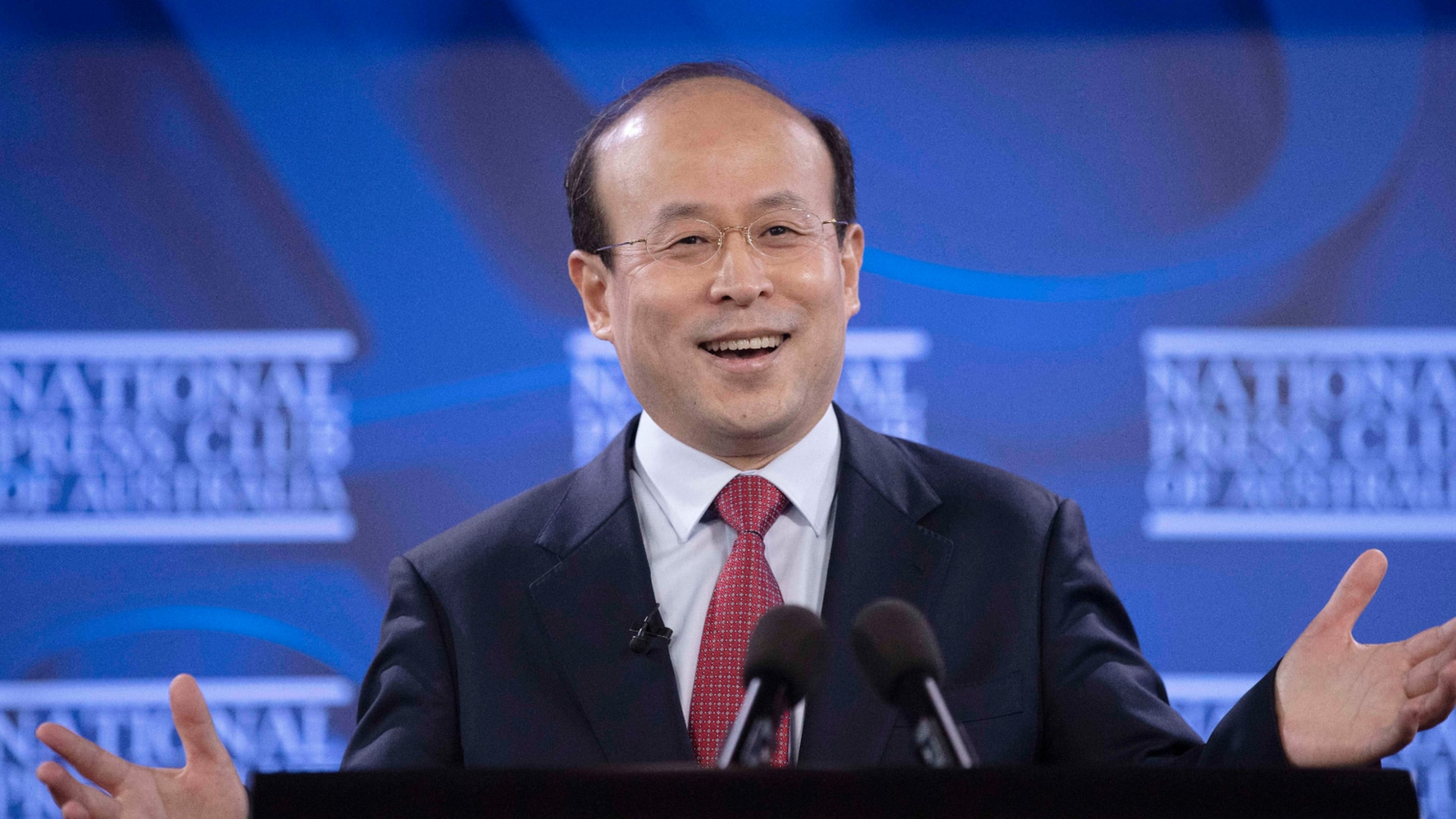
Obviously, Labor has declined the “invitation”. But this reveals events are now moving very fast.
There are three epic messages this week, pivotal to Australia’s future. The rout by global markets – in shares and bonds – brands Trump as an unreliable partner, the gravest threat to the global economy but capable of demanding things from Australia as an ally that conflict with our national interest; the retaliation from China’s Xi Jinping reveals that China will resist Trump’s economic coercion, possibly at serious cost to its economy, with Australia sure to suffer from any China growth slowdown; and the sharp deterioration in US-China relations, verging on a de facto economic warfare, threatens the global economy along with unpredictable geo-strategic consequences, certain to affect Australia.
Albanese and Dutton can’t deliver a detailed response now. That’s obvious. But this is a time for major party leadership. Are we seriously saying that Australia’s response to the current global trauma is going to be a minority government with people flocking to Greens, teals and independents as our political salvation? Are Australians actually going to do this?
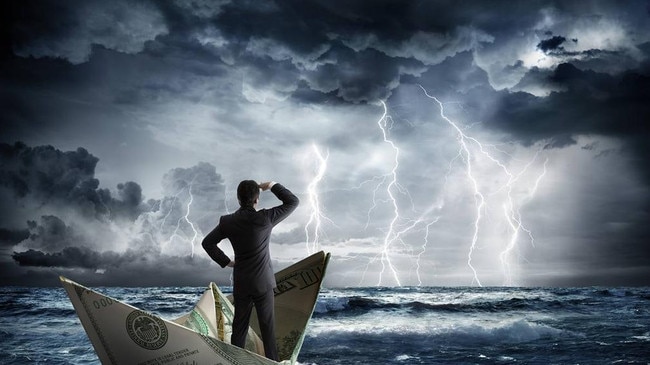
Albanese and Dutton need to think about this situation. The Trump crisis is a time for leadership. The obligation on them is to alert the Australian public to the realities of the changed world – economic, trade and strategic – that demand an Australia that is more competitive, productive, flexible and more defence self-reliant. The political advisers would recoil in horror at such an idea.
Their advice will be: stay cool, reassure the public, don’t make demands, don’t rock the boat, the last thing you want is a political leader addressing the challenges of a transformed world or talking truth to the people.
But if Albanese and Dutton don’t stand up, then maybe we deserve a minority government.
Nobody should misinterpret Trump’s retreat this week. The world has been put on notice. This was a spectacular win for the markets over Trump and perhaps for a few economic realists in his camp, notably Bessent.
Trump said he reversed because people were getting “a little bit afraid, they were getting yippie”. Sure, it was only one of the most dangerous market meltdowns in history. The truth is Trump buckled at the consequences of his blunder – the massive loss of wealth, income and investment his tariff eruptions posed for America. The risk was the trade crisis was turning into a financial crisis. It was when the markets began to sell off US government debt – revealing a loss of confidence in Treasury securities – that alarm went to a deeper level.
Faced with an unresolvable conflict between his loves – high tariffs and a high sharemarket – Trump chose the latter but kept alive the de facto trade war between the US and China. The worst blunder is to think Trump has learnt his lesson; he is merely doubling down against China.

The White House now confirms total tariffs imposed on China are 145 per cent, an untenable figure. The Wall Street Journal reports that a portion of the $US582bn ($931.5bn) in goods trading between the countries is already grinding to a halt. Such tariffs, if prolonged, would constitute the deepest US-China decoupling since China became a major trading economy.
Analysing the outlook, The Wall Street Journal wrote: “China accounted for around 13 per cent of all US goods imports in 2024. It is a source of a wide variety of goods, including smartphones, toys and industrial parts. Entire businesses have been built around assumptions of that access, with design, marketing and distribution in the US coupled with production in China.”
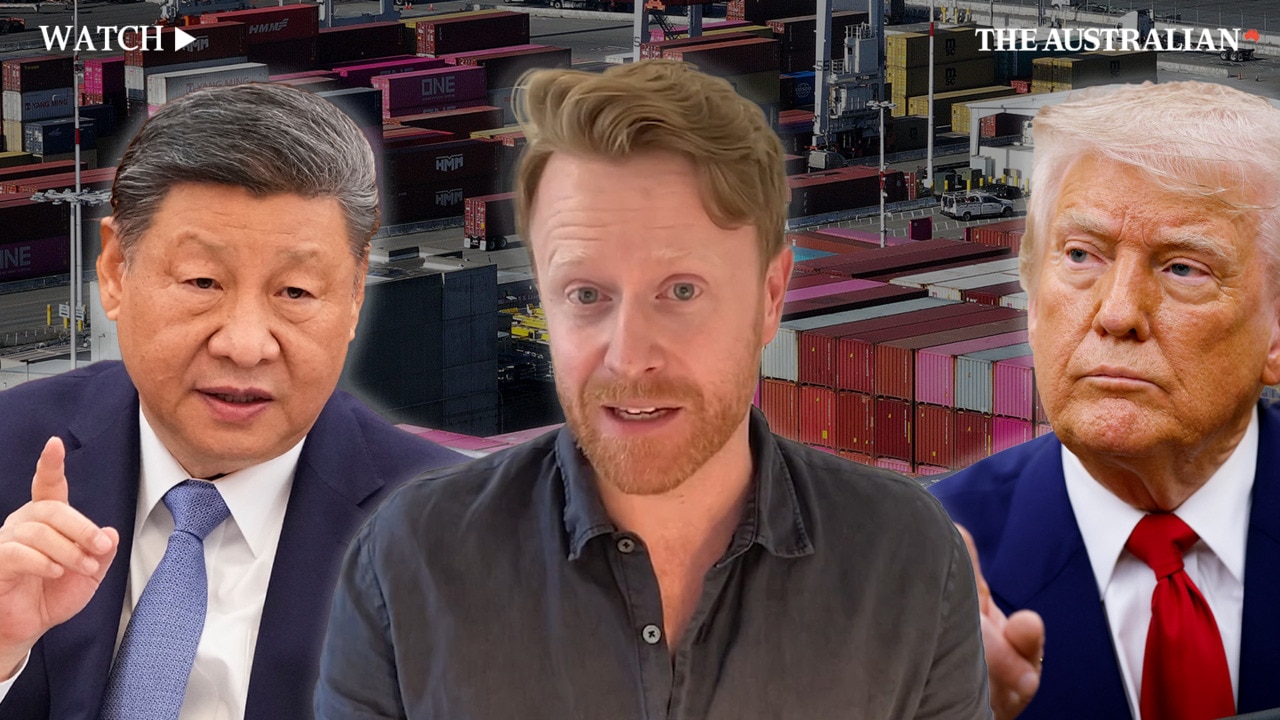
Does Trump have any coherent strategy with China? It seems unlikely beyond retaliation, trying to punish Beijing and seize an advantage for the US, none of which is likely to eventuate from these actions that are guaranteed to damage both nations.
Bessent, however, talks about isolating China – and that’s a dangerous omen for Australia if the US seeks to involve Australia in this tactic. This raises another question: what does Trump want from his allies? He punishes them but also wants their co-operation. The truth is Trump can’t settle; stability is beyond his nature. He is a danger to America and the world.
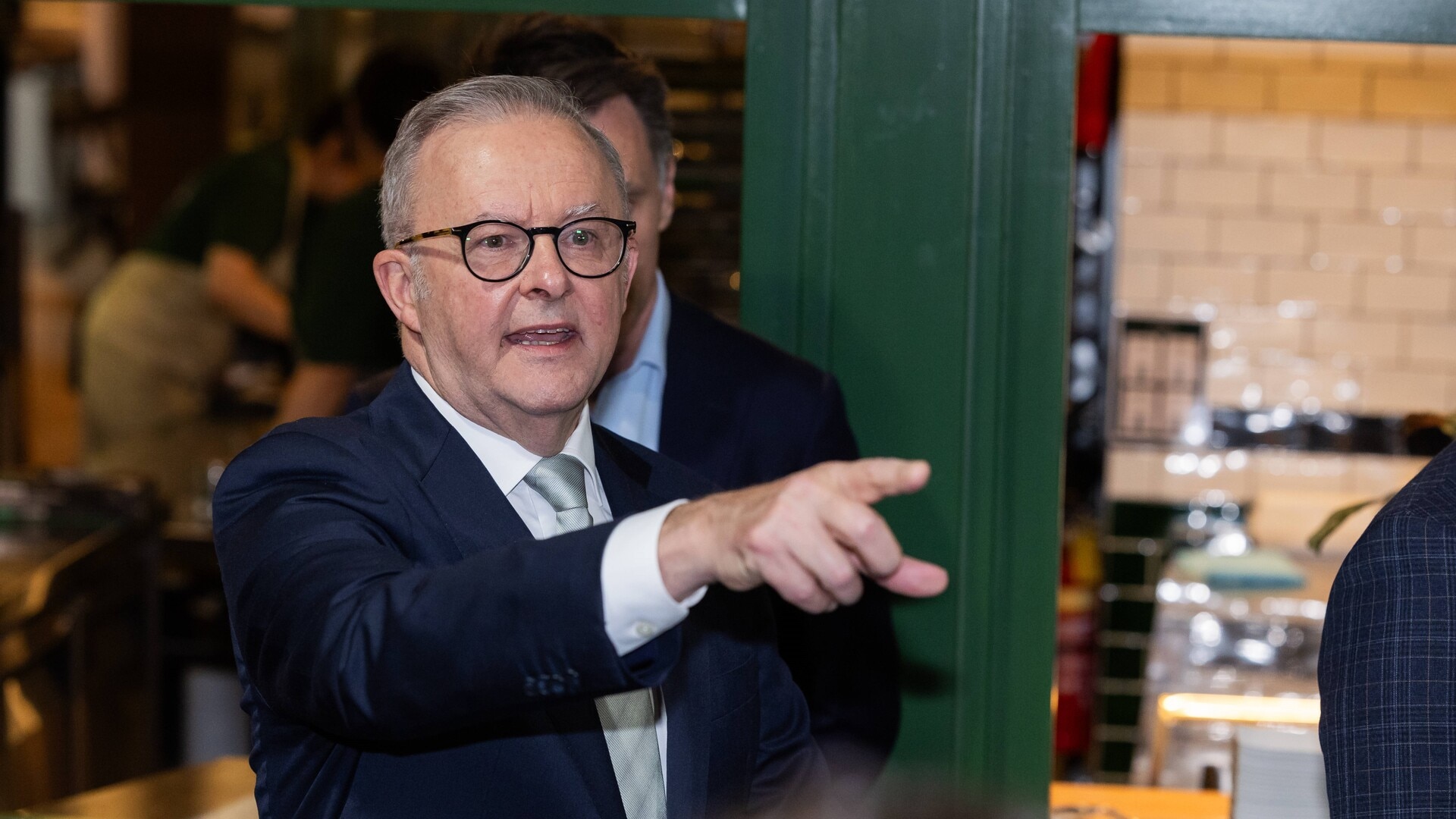
The iron has entered Labor’s soul at Trump. Just listen to Penny Wong’s remarks and tone. Australia and America are now fundamentally divided over trade, tariff and global economic policy. The longer Trump runs his “unfriendly” tariffs against Australia – to quote Albanese – the more the public and Australia’s policy community will be alienated from him. Both sides of politics say in any negotiations they will not compromise on the Pharmaceutical Benefits Scheme, biosecurity protection in agricultural and our big tech reforms.
Trump’s tariff pause won’t fool any governments in Asia. He will merely encourage them into deeper economic ties with China. The loss of US influence and prestige in Asia will complicate Australia’s effort to manage ties with both Beijing and Washington.
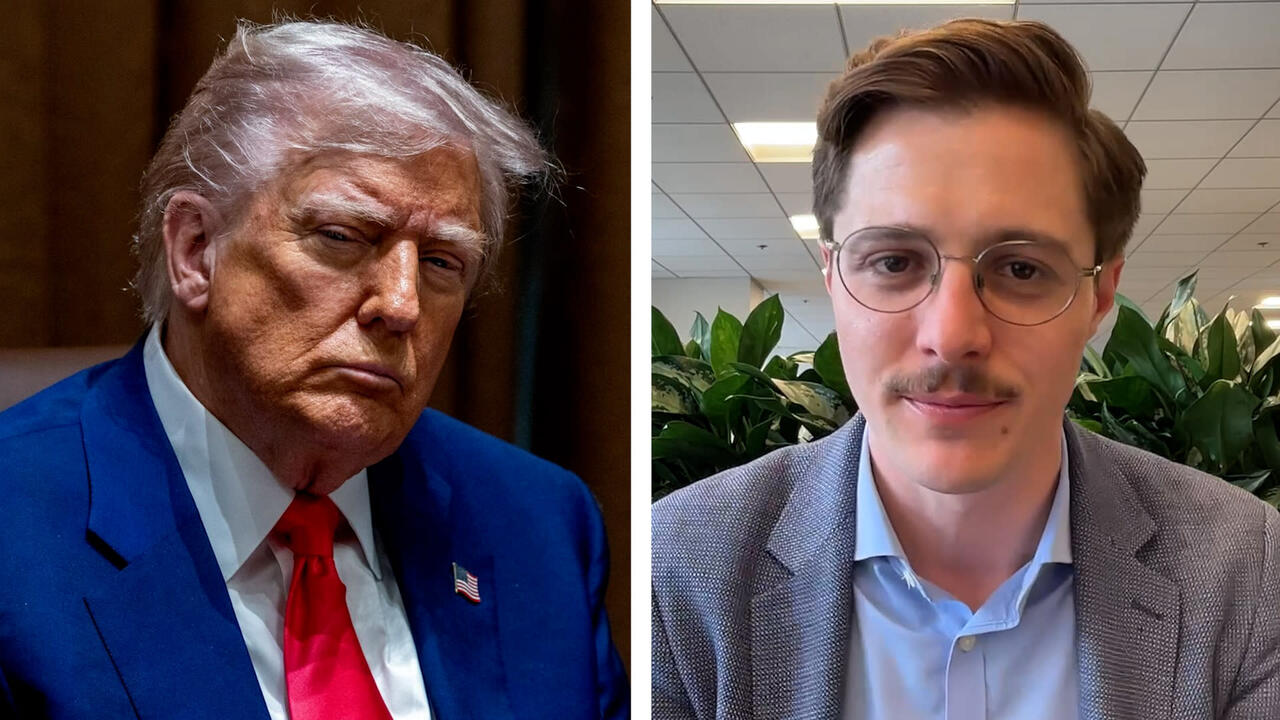
The Wall Street Journal said: “If decoupling from China is Mr Trump’s goal, one way to mitigate the damage is by expanding trade with allies. But Mr Trump’s tariffs slam friend and foe alike. Who knows what Mr Trump really intends, and it isn’t clear he even knows. His 90-day pause means the tariffs could come back with a vengeance if he doesn’t like the concessions countries offer.”
What might Xi Jinping do? China initially retaliated against Trump’s first round of tariffs and it has escalated from that point. But China’s “fight to the end” strategy leaves Beijing with tariffs at an untenable level, knocking out much of its US trade.
Trump no doubt thinks he will drive Xi into doing a deal. But perhaps Xi will be as stubborn as Trump in this contest. The episode betrays the fractures inside the Trump administration and fundamental for Australia is whether the reversal weakens the influence of Trump’s senior trade adviser, Peter Navarro, an anti-Australian advocate who has Trump’s ear.
The rift between Elon Musk and Navarro won global media attention with Musk, who backs zero tariffs, calling Navarro “a moron” and “dumber than a sack of bricks”. That seems an appropriate comment on Navarro’s views on trade deficits.
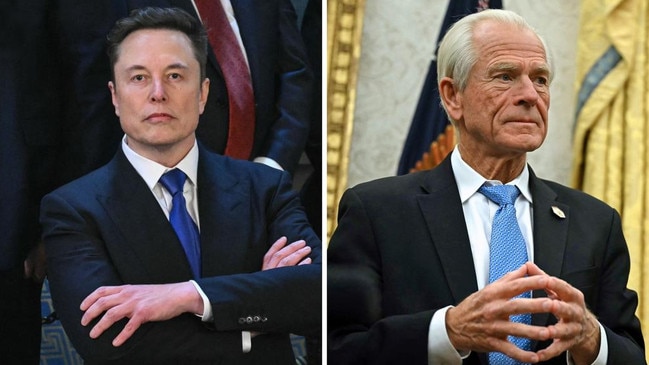
In response to the crisis, Chalmers says he wants to project confidence without complacency. He says Australia won’t finish in recession, defends his fiscal record and insists Australia faces the global uncertainty from strength. He happily points out the expectations in financial markets of four interest rate cuts this year in response to a global downturn.
Reserve Bank governor Michele Bullock struck a different tone. She said the current crisis was not as severe as the global financial crisis in 2008 when the bank cut the cash rate 3.75 per cent, played down any rush to urgent action and said it would take time to see how the crisis plays out.
Meanwhile, the business lobbies are activated, coming together in the wake of the tariff crisis calling for reforms to reduce business costs, cut red tape, restore balance to the IR system, deliver a competitive tax system and create a better project approvals system. Their agenda is justified and overdue but has yet to penetrate in Australia’s current politics.
The task for Dutton is to turn the global crisis into his opportunity. Dutton’s performance was sharper this week when he edged out Albanese in the leaders’ debate. Dutton and Taylor are drawing the nexus: Labor failed on cost of living and it will fail on the bigger economic challenge. But Dutton needs to reinvigorate the Coalition economic policy agenda. Dutton says the Coalition “will always manage” the economy better than Labor, yet he needs to persuade on that claim.
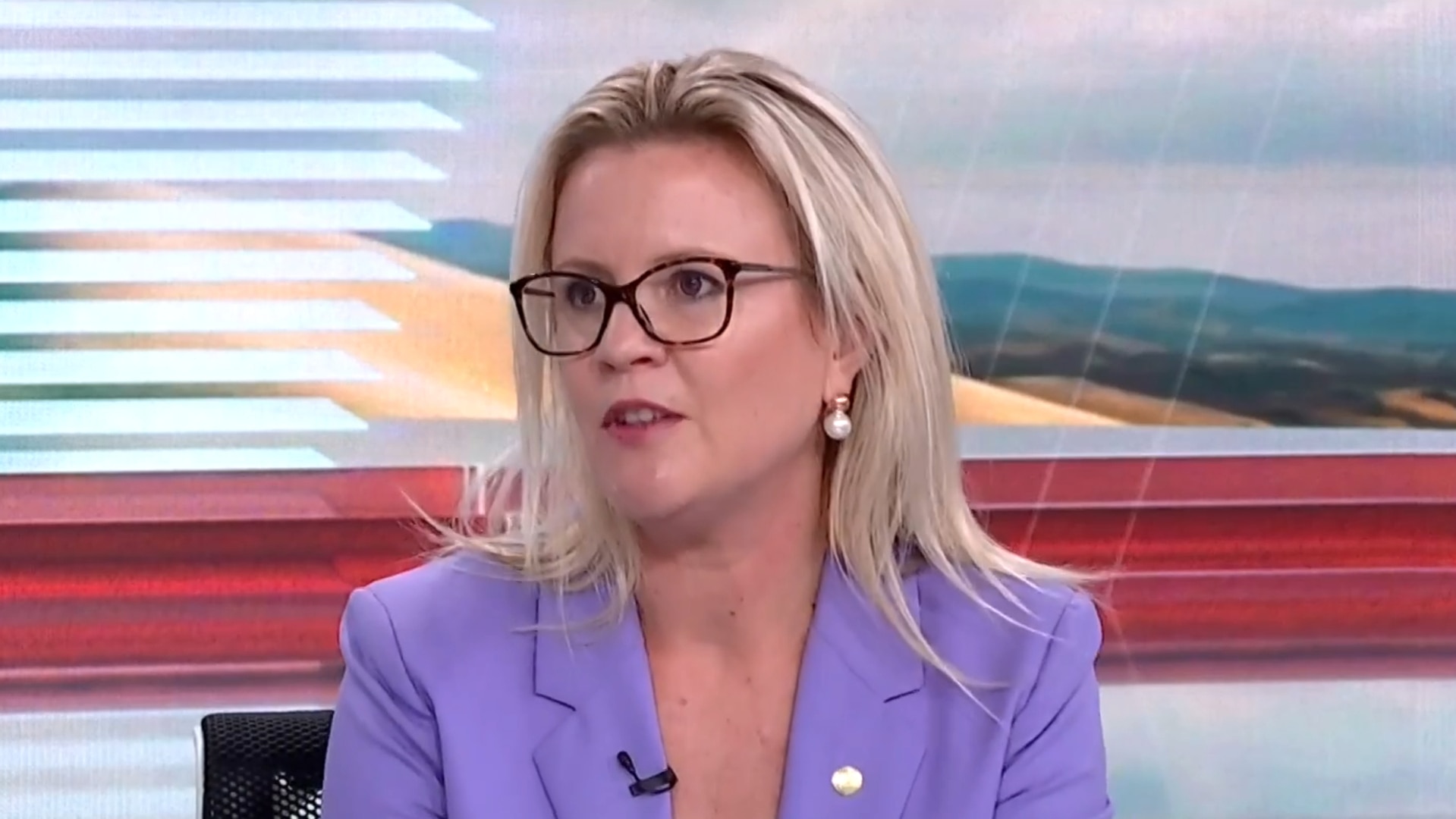
Polls suggest voters are disillusioned with Labor but they aren’t necessarily persuaded to vote Liberal. Dutton’s task is to knock down that wall of resistance. Labor’s second term looms as more of the same, hardly a plus. Much of the Coalition’s campaign tactic reflects the view that tough economic decisions cannot be marketed from opposition. That’s understandable. But if they can’t be marketed from opposition, and an incoming government has only a limited mandate, how can they be implemented from office?
This week Greens leader Adam Bandt cast a shadow over Albanese’s campaign. Bandt insisted that Albanese, short of a majority, must co-operate with the Greens in forming a minority government. Albanese, unsurprisingly, rules out any deal with the Greens. But the links between Labor and Greens are likely to get more prominence in the rest of the campaign.
That’s inevitable given polls pointing to a likely minority Labor government, which means parliamentary confidence delivered in part by the Greens. It gifts Dutton a campaign saying the alternative to the Coalition is a form of Labor-Greens partnership. Is this what Australia needs at present?




